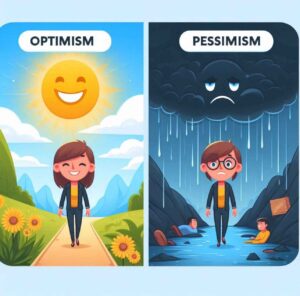Welcome Blessings!
(Tap 🔽 to see more topics!)


The way you see things and your whole mindset color your world. We all have those days. You know, when a tiny inconvenience feels like the end of the world or even the most significant problems seem solvable. It’s not just about being “positive” or “negative,” though. It’s more like, how do you automatically react to what life throws at you?
Do you expect things to work out or brace for impact? This isn’t some abstract idea… it’s the stuff of everyday life. It’s how you handle a flat tire, a tough conversation, or even decide what to have for dinner. This 20-question check-in, built on solid psychology, is like a peek behind the curtain. It’s designed to help you determine how your brain tends to lean, optimism or pessimism.
Optimism and pessimism, in simplified terms, refer to tendencies in interpreting events. Optimists tend to focus on positive aspects, while pessimists often focus on negative aspects. Research in positive psychology suggests that an optimistic outlook can be associated with benefits like increased resilience and better-coping mechanisms. However, it’s crucial to remember that everyone’s experience is unique, and these are broad generalizations.

For each question, choose the answer that best reflects how you would typically react in a given situation.
1. You face an unexpected challenge at work. Do you:
A) See it as an opportunity to learn and grow
B) Worry that it will lead to failure
2. A friend cancels plans at the last minute. Do you:
A) Assume they must be busy and suggest rescheduling
B) Think they don’t want to spend time with you
3. When you wake up in the morning, your first thought is:
A) “Today is a new opportunity!”
B) “I hope nothing goes wrong today…”
4. When you receive constructive criticism, do you:
A) Take it as a chance to improve
B) Feel discouraged and question your abilities
5. You experience a setback while pursuing a goal. Do you:
A) Adjust your approach and keep trying
B) Take it as a sign that it’s not meant to be
6. When you hear bad news, do you:
A) Look for ways to help or stay hopeful
B) Assume things will only get worse
7. If you fail at something, do you:
A) Consider it a temporary obstacle
B) See it as a personal flaw
8. A stranger smiles at you. Do you:
A) Smile back and assume they’re being friendly
B) Wonder if they’re laughing at you
9. When thinking about your future, do you:
A) Feel excited about the possibilities
B) Worry about all the things that could go wrong

10. You make a small mistake at work. Do you:
A) Laugh it off and correct it
B) Dwell on it and fear you’ll be judged
11. A significant change is coming in your life. Do you:
A) Feel excited for the new opportunities it may bring
B) Dread the uncertainty and possible difficulties
12. If a friend succeeds in something, do you:
A) Celebrate with them and feel inspired
B) Feel envious or compare yourself negatively
13. You hit a traffic jam while running late. Do you:
A) Stay calm and listen to music to pass the time
B) Get frustrated and assume your whole day will be ruined
14. When thinking about your health, do you:
A) Believe in maintaining good habits for long-term well-being
B) Worry about potential illnesses even if you feel fine
15. You try something new, and it doesn’t go well. Do you:
A) Laugh it off and try again
B) Feel embarrassed and hesitant to try again
16. If you have a bad day, do you:
A) Remind yourself that tomorrow is a fresh start
B) Feel like the bad luck will continue
17. Someone compliments you. Do you:
A) Say “Thank you!” and feel good
B) Wonder if they’re just being polite
18. You misplace something important. Do you:
A) Stay calm and search for it logically
B) Panic and assume it’s lost forever
19. If you see a sad news story, do you:
A) Look for ways to help or spread awareness
B) Feel helpless and overwhelmed
20. You’re working toward a dream. Do you:
A) Stay motivated and believe in the process
B) Doubt yourself and worry it won’t work out
Count how many A’s and B’s you chose, then find your score range below:
16-20 A’s: Fearless Optimist
11-15 A’s: Realistic Optimist
6-10 A’s: Balanced Mindset
1-5 A’s: Doom-Driven Pessimist
16-20 B’s: Doom-Driven Pessimist
11-15 B’s: Cautious Realist
6-10 B’s: Pragmatic Realist
1-5 B’s: Overwhelmed Pessimist
Scoring Basis: The scoring is derived from principles in cognitive psychology and positive psychology, mainly based on research by Martin Seligman, the father of positive psychology, and his work on learned optimism. Studies suggest that individuals with optimistic perspectives tend to have better mental and physical health outcomes, while those with a pessimistic mindset may experience increased stress and reduced resilience.
Your mindset isn’t some set-in-stone thing, though. You can nudge it in a more positive direction, even if you’re naturally a bit of a “prepare for the worst” type. Think of it like training a muscle – it takes time and a bit of effort, but you’ll see results. Below are a few things you can try, pretty doable stuff:
The point is that you’re not stuck with your current mindset. It’s a work in progress, and you can do it!

You’ve taken a peek into your head? You’ve seen where your brain tends to wander, whether towards sunshine or a bit of rain. Honestly, wherever you landed, that’s okay. Knowing yourself, really knowing yourself, is like finding the map to your adventure.
Remember, our mindset is like the lens through which we see the world. And just like you can clean a smudged lens, you can polish your mental outlook. You don’t have to do a complete overhaul overnight; start with those little tweaks we discussed. A bit of gratitude here, a flipped perspective there, and you’ll slowly begin to notice a shift.
This test was just a starting point, a little nudge to get you thinking. At the end of the day, you’re writing your story. And yeah, life throws curveballs, but you get to decide how you react. So, spill the beans! What did your score say? Were you surprised? Did anything click? And more importantly, what’s one tiny little shift you will try? Voila! Until next time!